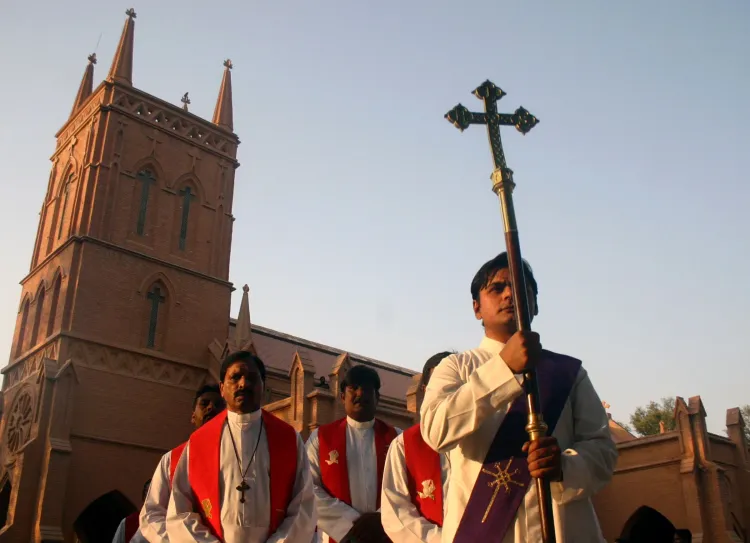Why Are Christian Activists Criticizing Pakistan's Justice System Over Blasphemy Laws?

Synopsis
Key Takeaways
- Pakistan Senate abolishes the death penalty for two offenses.
- Call for broader reform by Christian activists on blasphemy laws.
- Legislative changes viewed as superficial by critics.
- International scrutiny of Pakistan's human rights record remains high.
- The balance between economic interests and human rights is precarious.
Athens, Aug 15 (NationPress) The recent choice made by the Pakistan Senate to eliminate the death penalty for just two offenses has ignited considerable discussion across the nation, as Christian activists and human rights advocates call for more extensive reforms, particularly concerning the contentious issue of blasphemy laws, according to a report released on Friday.
Some have characterized this legislative move as a progressive step towards modernizing Pakistan's criminal justice system, as reported by NewsBomb based in Greece. However, critics view this action with skepticism, suggesting it serves more to maintain economic advantages than to foster genuine human rights advancements.
On July 18, the upper chamber of Pakistan approved the Criminal Laws (Amendment) Bill, which substitutes capital punishment with life imprisonment and financial penalties for two specific crimes: the public spoliation of a woman and assisting in the hijacking of an airplane or public transport. Nonetheless, the bill is incomplete pending Presidential approval, casting doubt on its final implementation. This decision has drawn criticism, as many question the government’s intentions behind the legislation and its commitment to real human rights reform.
Human rights activists have voiced their doubts over the government's choice to abolish the death penalty for only two offenses while leaving other severe penalties unchanged. The selective nature of this reform raises concerns about its alignment with a true commitment to eliminate capital punishment or address broader challenges within Pakistan's judicial system.
Critics argue that by concentrating solely on two crimes, the Pakistan government seeks to project an image of progress to international observers, particularly European trading partners, without tackling the more controversial and entrenched issues within the nation’s legal structure.
"The timing of the bill’s passage is notably aligned with Pakistan's ongoing efforts to retain lucrative trade privileges with European nations. The European Union (EU) has recently linked trade benefits to adherence to human rights criteria. Observers suggest this legislative action may focus more on safeguarding economic interests than on enacting substantial reforms," the report indicated.
Pakistan's blasphemy laws have garnered international criticism. Under these statutes, individuals can face the death penalty and other harsh penalties for perceived religious insults. Christian activists, minority groups, and human rights defenders urge lawmakers to adopt a more holistic approach since blasphemy-related offenses have not been addressed in the recent bill, as detailed by NewsBomb. The misuse of these laws has created an environment of intolerance, where allegations can lead to mob violence, extrajudicial killings, and severe social rifts.
The slow progress in reforming these laws highlights Pakistan's challenge in balancing religious sensitivities, political pressures, and international human rights expectations. Christian activists and minority rights groups have responded to the Senate's decision with a blend of frustration and cautious hope, as noted in the report. Human rights organizations have condemned the Pakistani government's actions as superficial reforms that fail to address the underlying causes of injustice. The continued existence of capital punishment for many offenses, coupled with weak legal protections for minorities, paints a bleak picture of human rights in Pakistan.
International human rights entities and foreign governments are closely scrutinizing Pakistan's recent legislative actions. Some welcome the partial abolition of the death penalty as a positive development, while others express doubts regarding the depth and sustainability of these reforms. The sluggish pace of legal reform, along with ongoing abuses and discrimination, has bred cynicism about the government's willingness to safeguard human rights effectively.









